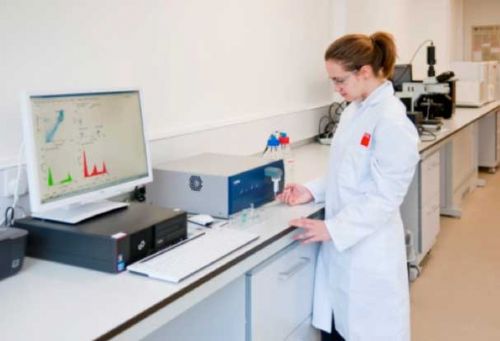
Pig breeding company PIC UK has opened a world-class GT Centre of Excellence which is thought to be the first of its type in the UK and probably in Europe. GT is PIC’s terminology for the transfer of superior genes by artificial insemination (A.I.). Research and development work on semen at the centre will have the potential to benefit commercial pig production throughout the UK.
The facility will provide a direct link between the company, commercial producers and R&D on A.I. to ensure trial work takes account of commercial requirements and the results can be disseminated rapidly. Among other benefits, the resource will also be used to provide training for UK pig producers who buy semen from boar studs and those who collect semen from boars at on-farm studs.
The centre, at Colworth Science Park at Sharnbrook in Bedfordshire, is also home to the company’s GT Orderline operation. The laboratory at the facility is equipped with advanced scientific instruments which include a flow-cytometer and a fluorescent microscope, thought to be unique in semen-testing laboratories in the UK. They will provide the opportunity for more detailed semen assessment to include sperm viability and the capacitation status of the sperm, which is the process sperm pass through to achieve fertilisation.
The GT Centre of Excellence was officially opened today by Andrew Saunders, agriculture director with Tulip Ltd. He said: "Pig production today faces many challenges and opportunities. This significant investment by PIC will help pig producers to exploit new technology quickly and efficiently.’’
Sue Corning, PIC UK general manager, says the significant investment in the centre underlines the company’s commitment to help UK producers to retain and improve their competitive position in Europe, and demonstrates PIC’s confidence in the future of the UK pig industry.
"The centre is just one part of our current investment programme. We are also investing in new equipment at UK boar studs and we are updating our dedicated transport fleet.
"PIC is confident the UK pig industry has a good future, with A.I. being a key element in helping to improve production efficiency and supporting the overall objective of retaining competitiveness."
The company’s key objective in establishing the centre is to provide an interface between customers and PIC’s semen production units – the studs. "We operate strict biosecurity protocols at the studs which mean no visitors are allowed," says Sue Corning. "The centre will provide a link between the studs and our customers to improve communication, to facilitate a two way exchange of information and to enable us to work together to improve on-farm reproductive performance."
Only limited R&D work on porcine semen production has taken place in the UK over the last 20 years, she says. "R&D in Europe doesn’t always take account of production aspects that are unique to the UK. For example, 40 per cent of UK sows are served outdoors under a wide range of environmental conditions and, with a high health focus in the UK, many of the studs are remote from pig populations, increasing travelling times for semen transport."
Work at the laboratory will focus on projects directly relevant to the UK pig industry with the overall objective of improving reproductive performance on farm. Work areas, over time, are likely to include: the effect of temperature on semen production and viability including the effect of temperature in boar accommodation, in drop-off boxes and semen storage units; the effect of UV exposure on semen quality; improved monitoring of morphology; more detailed review of factors which affect morphology, and comparisons of extenders used as part of the semen production process.
The centre will help in several ways to engage customers more closely with the product, says Sue Corning. There will be opportunity to:
· Meet GT Orderline staff, who focus on getting the right GT product to the right place at the right time
· Review PIC’s GT courier network, which delivers 90 per cent of the product in temperature-controlled vans covering 10,200 miles each week
· Visit and use the training facilities
· Provide producers with an update on sperm physiology, prepare semen samples for assessment, assess semen quality characteristics, for example morphology, plus carry out detailed assessments on factors which affect semen quality, including on-farm semen storage and handling.
Says Sue Corning: "There will also be a live link between a PIC stud and the GT centre to enable an interactive Q&A session between PIC stud staff and customers. Our aim is to provide our customers and ourselves with a better understanding of each other’s requirements."
